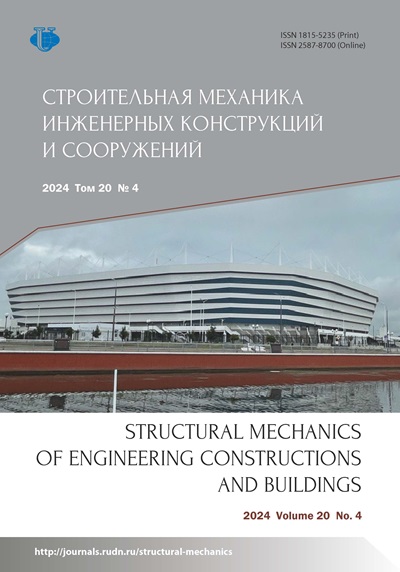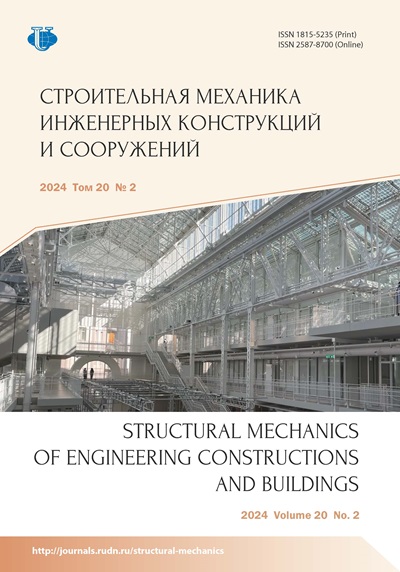Optimal Duration of Observations During Seismic Inspection of Buildings
- Authors: Voskresenskiy M.N.1, Kurdanova A.A.1
-
Affiliations:
- Institute of Geophysics Ural Branch of the Russian Academy of Science
- Issue: Vol 20, No 2 (2024)
- Pages: 182-194
- Section: Experimental researches
- URL: https://journals.rudn.ru/structural-mechanics/article/view/39223
- DOI: https://doi.org/10.22363/1815-5235-2024-20-2-182-194
- EDN: https://elibrary.ru/DUABVN
Cite item
Full Text
Abstract
Studying the nature of the occurrence and propagation of microseismic tremors has not lost its relevance over the past few decades. Currently, the analysis of microseisms is the basis of some engineering and geological studies, including those aimed at the inspection of structures of various purposes. The procedure for preparing and conducting surveys is governed by a system of regulatory documents. However, the current codes and specifications represent a general guide for assessing the operational properties of building structures. Therefore, specific survey methods need to be clarified and detailed. Describes the experiment of examining the building regarding the dynamics of frequency characteristics within 24 hours. The observation system was implemented in the form of 16 points, evenly distributed over the volume of the building. Spectral analysis based on FFT was carried out to identify the time intervals within the 24-hour period with a pronounced maximum and minimum level of man-induced impact on the studied subject. During the hours of maximum exposure, the spectra were correlated according to records of different duration in terms of the correspondence of frequency components. The necessary and sufficient duration of registration of microseismic vibrations was derived to determine the frequency of natural vibration of a building when the observation points are located on the lower and upper floors.
About the authors
Mikhail N. Voskresenskiy
Institute of Geophysics Ural Branch of the Russian Academy of Science
Email: voskresenskiy.mn@gmail.com
ORCID iD: 0000-0002-6222-7265
SPIN-code: 4710-9710
Candidate of Technical Sciences, Senior Researcher, Head of the Seismometry Laboratory, Institute of Geophysics
Yekaterinburg, RussiaAlena A. Kurdanova
Institute of Geophysics Ural Branch of the Russian Academy of Science
Author for correspondence.
Email: a.truuuuman@gmail.com
ORCID iD: 0000-0002-1582-8113
SPIN-code: 7695-6043
Junior Researcher at the Laboratory of Seismometry, Institute of Geophysics
Yekaterinburg, RussiaReferences
- Gorbatikov A.V., Stepanova M.Yu., Korablev G.E. Microseismic field affected by local geological heterogeneities and microseismic sounding of the medium. Izvestiya, Physics of the Solid Earth. 2008;44(7):577–592. https://doi.org/10.1134/S1069351308070082
- Kalinina A.V., Ammosov S.M., Tatevosjan R.Je., Turchkov A.M. On the use of microseisms for seismic microzonation. Issues of engineering seismology. 2022;49(1):5–17. (In Russ.) https://doi.org/10.21455/VIS2022.1-1
- Neukirch M., García-Jerez A., Villaseñor A., Luzón F, Ruiz M., Molina L. Horizontal-to-Vertical Spectral Ratio of Ambient Vibration Obtained by Hilbert–Huang Transform. Sensors. 2021;21:3292. https://doi.org/10.3390/s21093292
- Putti S.P., Satyam N. Evaluation of Site Effects Using HVSR Microtremor Measurements in Vishakhapatnam (India). Earth Systems and Environment. 2020;4:439–454. https://doi.org/10.1007/s41748-020-00158-6
- Sharov N.V., Malovichko A.A., Shcukin Y.K. Earthquakes and microseismicity in modern geodynamics problems on the East European platform. Part 2. Microseismicity. Petrozavodsk; 2007. (In Russ.) EDN: QKGNRR
- Louie J.N. Faster, better: shear-wave velosity to 100 meters depth from refraction microtremor arrays. Bulletin of the Seismological Society of America, 2001;91(2):347–364. https://dx.doi.org/10.1785/0120000098
- Neukirch M., García-Jerez A., Villaseñor A., Luzón F, Ruiz M., Molina L. Horizontal-to-Vertical Spectral Ratio of Ambient Vibration Obtained by Hilbert–Huang Transform. Sensors. 2021;21:3292. https://doi.org/10.3390/s21093292
- Mohamed A., Ali S.M., Mostafa A. Estimation of seismic site effect at the new Tiba City proposed extension,Luxor, Egypt. NRIAG Journal of Astronomy and Geophysics. 2020;9(1):499–511. http://doi.org/10.1080/20909977.2020.1784697
- Davydov V.A. Studying the seismic reaction of soils during microseismic sounding // Herald of KRAUNTS. Series: Earth Sciences. 2023;2(58):90–100. (In Russ.) https://doi.org/10.31431/1816-5524-2023-2-58-90-100
- Karapetjan Dk.K., Ajrapetjan O.Ju., Matevosjan G.M., Karapetjan R.K. Comparative analysis of the dynamiccharacteristics of various types of building during microseismic vibrations. Geology and geophysics of Russian South. 2021;11(3):103–114. (In Russ.) http://doi.org/10.46698/VNC.2021.70.17.009
- Zaalishvilli V.B., Melkov D.A., Kanukov A.S., Dzeranov B.V., Shepelev V.D. Application of microseismic andcalculation techniques in engineering-geological zonation. International Journal of Geomate. 2016;10(19):1690–1674. http://doi.org/10.21660/2016.19.5312
- Eremeev P.G., Lebedeva I.V. Monitoring and Analysis of Regulatory Documents on the Design of Structures With Due Regard for the Progressive Collapse. Industrial and Civil Engineering. 2021;12:15–21. (In Russ.) http://doi.org/10.33622/0869-7019.2021.12.15-21
- Anosov G.I., Drobiz M.V., Konovalova O.A., Sotnikov D.S., Chugaevich V.Ja. Assessment of seismic stability ofthe Academic Building No. 3 of the I. Kant Russian State University using the Nakamura technique. Bulletin of kamchatka regional association «Educational-Scientific Center». Earth sciences. 2010;1(15):223–231. (In Russ.) EDN: MSVNNR
- Kuzhahmetova Je.R., SutyrinV.I. Influence of the soil base on the stress-strain state of a large-span building witha cylinder-and-slab roof. Structural mechanics of engineering constructions and buildings. 2022;18(5):444–457. https://doi.org/10.22363/1815-5235-2022-18-5-444-457
- Ehsan H., Tom L., Sreekanth B., Kifaytullah M., Amir M. Earthquake safety assessment of buildings throughrapid visual screening. Buildings. 2020;10(3):51. http://doi.org/10.3390/buildings10030051
- Lapidus A.A., Topchij D.V. Organization of Works on Inspection of Buildings and Structures. Promyshlennoe i grazhdanskoe stroitel’stvo [Industrial and Civil Engineering]. 2023;3:12–15. (In Russ.) http://doi.org/10.33622/0869-7019. 2023.03.12-15
- Efremov A.M., Bojko V.D., Sergeevcev E.Ju., Trekin N.N., Kodysh Je.N., Terehov I.A., Shmakov S.D. Determi- nation of the Period of Safe Operation of Industrial Buildings and Structures. Industrial and Civil Engineering. 2022;10:14– 19. (In Russ.) http://doi.org/10.33622/0869-7019.2022.10.14-19
- Olejnik P.P., Ulitina A.D. Construction Control as a Strategy for Improving the Quality of Buildings andStructures. Industrial and Civil Engineering. 2020;4:22–27. (In Russ.) http://doi.org/10.33622/0869-7019.2020.04.22-27
- Efremov A.M., Bojko V.D., Sergeevcev E.Ju., Trekin N.N., Kodysh Je.N., Terehov I.A., Shmakov S.D. TakingInto Account the Joint Effect of Defects on the Bearing Capacity of Structures. Industrial and Civil Engineering. 2022;8:11–18. (In Russ.) http://doi.org/10.33622/0869-7019.2022.08.11-18
- Olejnik P.P., Kurenkov O.G. Assessment of the degree of reflection of the quality of the object in the as-builtdocumentation. Construction production. 2019;1:78–81. (In Russ.) https://doi.org/10.54950/26585340_2019_1_78
- Voskresenskij M.N., Parygin G.I., Senina T.E., Senin L.N. Expositional dynamic engineering-seismometricmonitoring of the building of the institute of geophysics ub ras with use of the hardware-software complex “Register-SD”. Bulletin of Perm University. Geology. 2019;18(1):38–42. https://doi.org/10.17072/psu.geol.18.1.38
- Voskresenskij M.N., Parygin G.I., Kosorotova E.A., Kurdanova A.A. Research of the process of registration,processing and interpretation of seismic events. Ural geophysical bulletin. 2021;3:11–18. (In Russ.) https://doi.org/ 10.25698/UGV.2021.3.2.11
- Romanov V.V., Mal’skij K.S. Certificate of registration of the computer program No. 2016615697.27.05.2016. MicroSeisTool is a program for processing records of microseismic vibrations. Application No. 2016611234 dated 02/16/2016
- Romanov V.V., Mal’skij K.S., Dronov A.N. Selection of optimum parameters of microseismic vibration recording in underground excavations. Mining informational and analytical bulletin (Scientific and technical journal). 2016;7:101–107. (In Russ.) EDN: WGBLZJ
- Davydov V.A. Shallow seismic sounding based on ellipticity analysis of microtremor. Georesources. 2019;21(1): 78–85. https://doi.org/10.18599/grs.2019.1.78-85
















